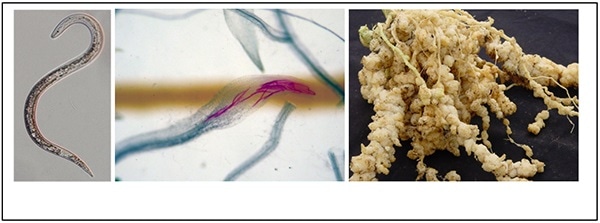Root-knot nematodes (RKNs, Meloidogyne spp.) are known to infect a wide variety of plants, including many agriculturally significant species like corn, soybean, and cotton, as well as a variety of ornamentals and vegetables.

Root-knot nematode left; acid-fuchsin-stained RKNs in tomato root (center); gals formed by RKNs. Image Credit: Taketo Fujimoto, Hiroshi Abe, Takayuki Mizukubo, and Shigemi Seo.
Such parasites promote the formation of galls in plant roots, causing extensive damage to plants and eventually leading to loss of significant crops. At present, growers are using synthetic nematicides to control RKNs but these compounds can damage the microbial diversity in soil and harm the environment. Hence, there is a need to develop sustainable alternative control methods.
We have been seeking natural compounds that activate plant defense systems and do not have direct nematicidal activity using the combination of RKNs and their host plants. We were most excited to discover that phytol, a chlorophyll constituent, has an inhibitory effect on the root invasion by a certain harmful plant nematode without killing it. We did not expect this molecule to be involved in RKN resistance.”
Shigemi Seo, Researcher, National Institute of Agrobiological Sciences
“We noticed that plant leaves discolored yellow or pale green when their roots were parasitized by RKNs and confirmed a decrease in chlorophyll content in such leaves. We hypothesized that chloroplast-related compounds would accumulate in RKN-parasitized roots and induce the host defense against RKNs,” added Seo.
We analyzed root metabolites and found accumulation of phytol, a constituent of chlorophyll. When phytol was applied to plant roots, RKN invasion of the roots was inhibited. This inhibition was not due to the direct nematicidal activity of phytol, since this compound did not kill RKNs.”
Shigemi Seo, Researcher, National Institute of Agrobiological Sciences
For several years, researchers had already known that phytol is a constituent of chlorophyll and is a ubiquitous compound found in nearly all photosynthetic organisms, but its role as a plant defense-signaling molecule was not explored fully.
Phytol has the potential to be a promising material for eco-friendly agrochemicals for RKN control. We are currently investigating its effects on other plant parasitic nematodes as well as other pathogenic microorganisms.”
Shigemi Seo, Researcher, National Institute of Agrobiological Sciences
Source:
Journal reference:
Fujimoto, T., et al. (2021) Phytol, a Constituent of Chlorophyll, Induces Root-Knot Nematode Resistance in Arabidopsis via the Ethylene Signaling Pathway. Molecular Plant-Microbe Interactions. doi.org/10.1094/MPMI-07-20-0186-R.